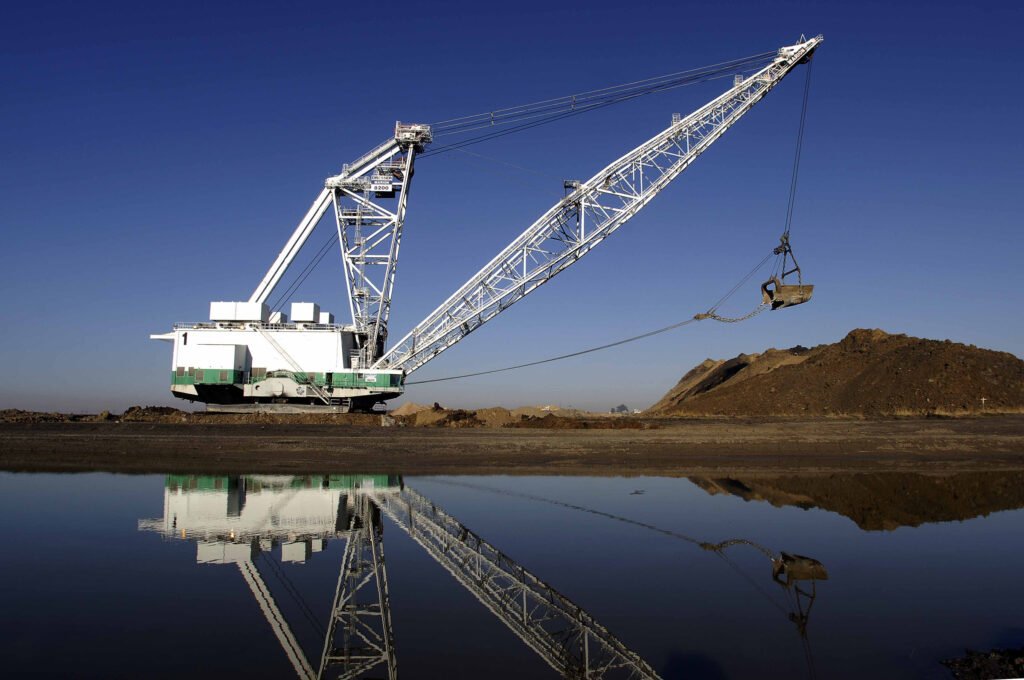
The challenge facing business and society in the 21st century is how to use resources more efficiently. Every business large or small needs to consider carefully:
1. how to reduce its use of energy
2. how to minimise waste.
The central economic problem is how to match finite resources with unlimited wants. With the demand for resources rising as the world economy grows this is becoming more of a challenge. Leading global companies like Anglo American strive to find new solutions to this problem every day.
Anglo American is one of the world’s largest mining companies. Its portfolio of mining businesses spans precious metals and minerals – in which it is a global leader in platinum and diamonds, base metals (copper and nickel) and bulk commodities (iron ore, metallurgical coal and thermal coal). The company’s mining operations and extensive pipeline of growth projects are located in southern Africa, South America, Australia, North America and Asia. The purpose of the organisation is set out in a mission statement.
‘to be the leading global mining company – through the operational excellence of world class assets in the most attractive commodities and a resolute commitment to safe and sustainable mining.’
In 2008 there was a downturn in world economic activity. This resulted from a loss of confidence in the world financial system. The downturn led to a steep fall in commodity prices such as coal, copper and platinum. By late 2009 these prices started to rise again as demand for commodities increased.
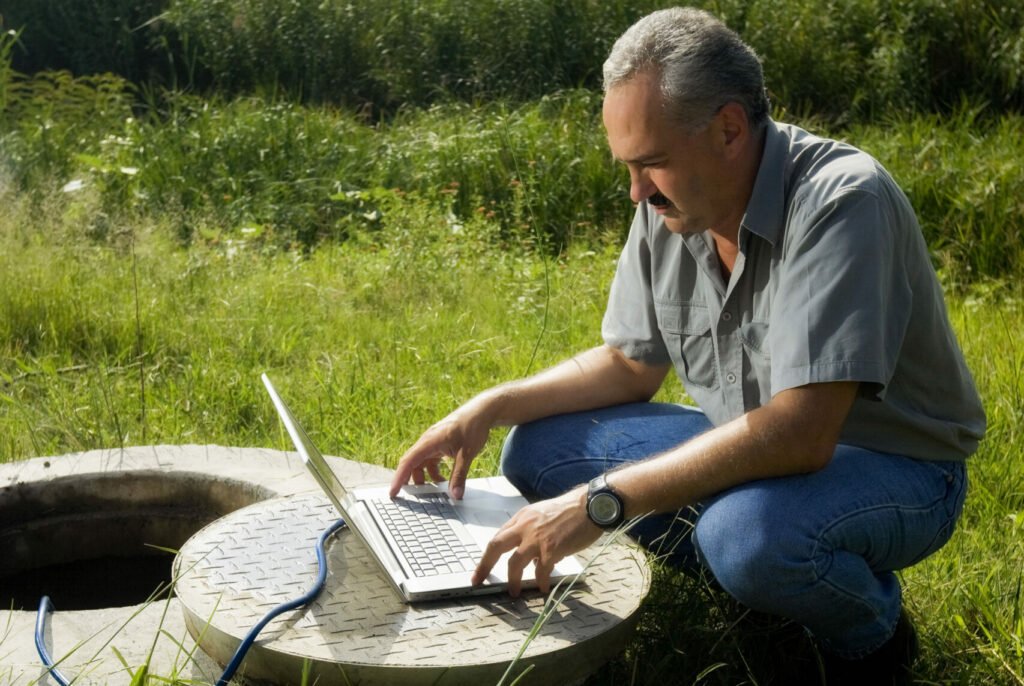
Although mining companies are affected by changes in economic activity, mining is a long-term investment business. Firms like Anglo American have to take a long term view of the business. This involves extracting commodities in a sustainable way over a long period of time. The company focuses on those commodities in which it has a favourable position. It concentrates on larger mines where extraction will be possible for many years into the future. It also looks at mining projects where costs can be kept to a minimum but where there are opportunities to expand operations.
There are several issues of sustainability facing Anglo American. Key ones are:
- securing energy supplies, such as electricity and resources, including water, for the future
- managing emissions to minimise harm.
Anglo American uses large quantities of energy in its operations. It also generates the potential for energy, e.g. by producing coal to generate power stations. A key aim of the company therefore is to do more with less. It must achieve maximum efficiency with minimum waste.
Anglo American believes that by operating in innovative and socially responsible ways it can do things better than its rivals. Doing things better in business is referred to as competitive advantage. Social responsibilities are those duties to all the stakeholders of a business, not just the shareholders. Embedded within social responsibility is the concept of sustainable development.
Sustainable development involves using resources so that:
- resources are available to meet the needs of people now
- resources can be available to future generations
- the needs of the natural environment are respected.

This case study shows how Anglo American, through its aims and objectives, is driving forward its approach to sustainable development.
Aims and objectives
Businesses need to have clear aims to work towards. Aims are the long term intentions of a business. They provide a focus for its activities. Anglo American’s aims are clearly set out in its mission. The aims involve a triple bottom line. Anglo American’s ‘triple bottom line’ measures its economic, social and environmental performance. Anglo American seeks to balance the triple bottom line across all its activities – projects and operations. This would translate into:
- making a profit for shareholders
- providing returns to society by providing jobs or showing responsibility in international, national and local communities
- minimising any negative effects on the natural environment.

Every business needs to break down its broad aims into more specific objectives. Objectives are the medium-term ‘stepping stones’ that help a business achieve its aims. For Anglo American, these include:
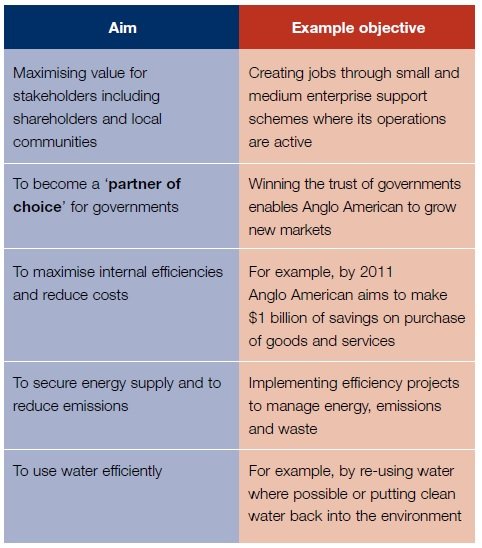
SMART objectives
Businesses need to set out their objectives in ways that are clear and easy to measure. Using SMART objectives makes it easy to assess whether targets have been met.
Specific – relating to clearly identifiable targets, for example, to be the ‘partner of choice’ for governments.
Measurable – set out in ways that can be measured. Examples include cost reductions, waste reductions or energy efficiency targets.
Achievable – objectives should not involve unrealistic targets. They should not be set too low either. Anglo American believes that making cost savings of $1 billion by 2011 is an ambitious yet achievable target.
Relevant – the objectives should relate to key business or corporate aims. For Anglo American this means using resources more sustainably.
Time-framed – giving a clear deadline or endpoint by which the objective needs to have been achieved.
Examples of Anglo American’s SMART objectives can be analysed.
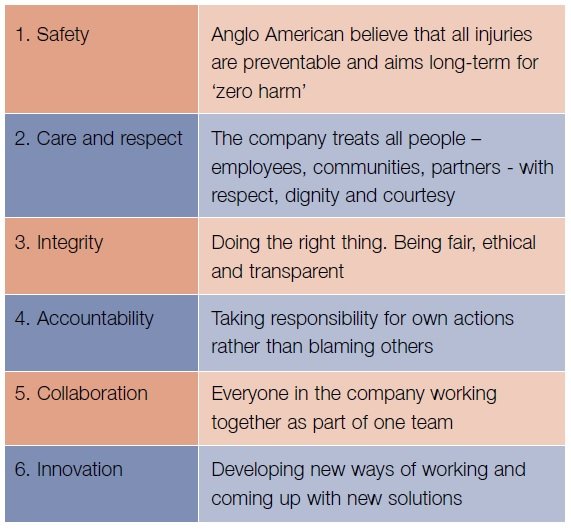
Strategy
Aims and objectives set out the ends that firms are seeking to achieve. A strategy is the medium- to long-term plan by which the aims and objectives are met. Anglo America’s strategy is to create ways of working within the company that focus on sustainable development and balancing the triple bottom line.
Anglo American has six guiding values. The values help to create a culture focusing on sustainability. The culture of an organisation is the typical pattern of behaviours and beliefs held by its members. The culture affects the attitudes, management styles and decisions made by the staff. An important way in which a firm can shape this culture is by setting out a values statement. This clarifies what the organisation believes in. For example, the safety of people is a core value of Anglo American. The goal is that of causing zero harm. Everyone in the organisation understands the importance of working to reduce energy use and waste creation.
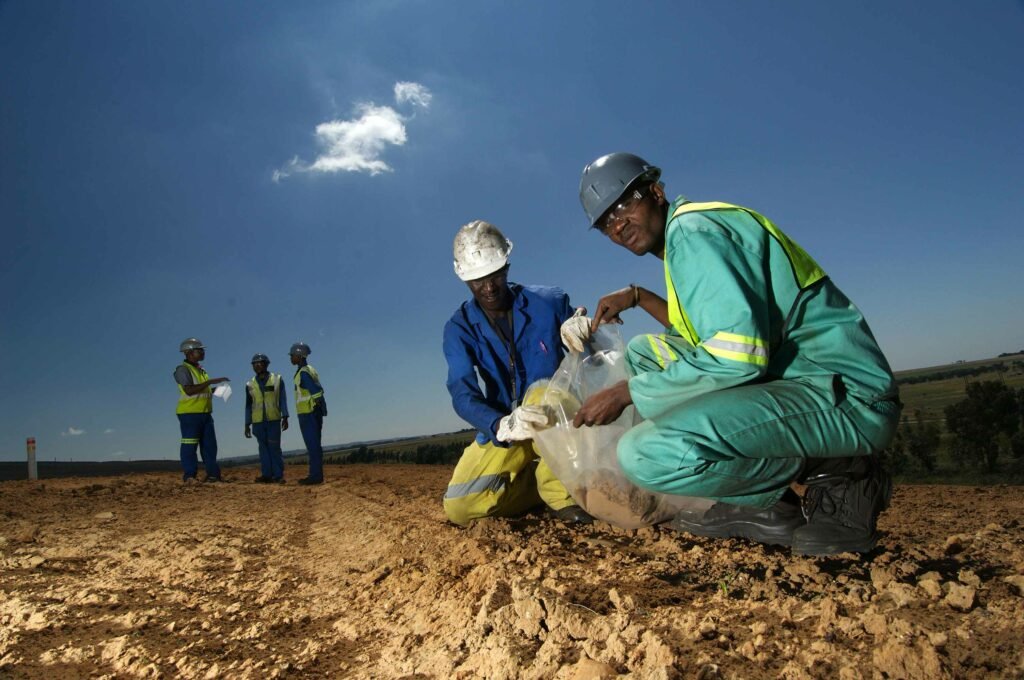
In addition, Anglo American has a range of strategic programmes designed to develop innovative ways to use new technology. The result is reduced energy use and fewer emissions. Some of the programmes are specific to a particular site. Others work across the organisation. Examples of these strategic programmes include:
- Investing in carbon capture technology. Coal fired power stations generate carbon dioxide emissions. New technology can be used to capture this carbon before release into the atmosphere. It can then be stored safely, e.g. underground.
- Investing in alternative energy such as wind power.
- Creating plans and actions for recycling water.
- Centralising the global supply chain. This can cut down journey times and distances that materials travel.
Anglo American’s strategy is to protect the environment and minimise the impact of its operations. Anglo American also aims to make a sustainable and positive difference to community development. This involves acting with integrity to build respectful relationship within the societies in which it works.
Tactics
Strategies are the big plans of an organisation. Tactics are the shorter term plans and activities which a firm puts in place to implement its strategy.
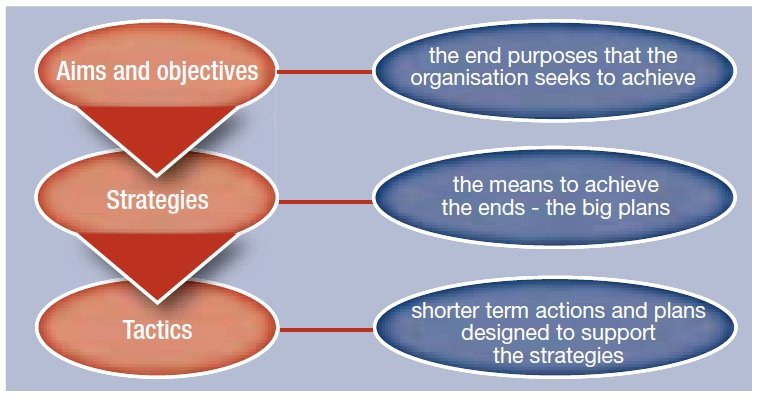
Anglo American implements activities which are designed to enable better use of resources, leading to greater efficiency and sustainable practice. Examples of these include:
• the development of two mine-gas power stations in Australia. These capture methane emissions from mines. This is then re-used to generate energy. The power generated from these is equivalent to reducing carbon emissions by about 2.3 million tonnes per year. This is equivalent to taking 580,000 cars off the road • a wind farm established at Anglo American’s zinc mine in Country Tipperary in Ireland. The location was suitable because it was already connected to the National Grid. It is also a naturally windy site. This now provides clean electricity for the mining operation and two local towns. It will continue to benefit the community after the mine has closed • Anglo Platinum’s joint venture, Bafokeng Rasimone platinum mine outside Rustenburg in South Africa, started re-using the water from its return water dam for its operational process in 2009. This was achieved by installing a simple sand filter that removes unwanted water-borne solids. As a result, the monthly amount of potable water used by the process plant has fallen from nearly 150,000 m3 in September 2008 to less than 60,000 m3 in June 2009. The project’s R2.8 million ($330,000) phase-one investment has already been offset by these savings • setting out a programme to centralise Anglo American’s procurement and supply chains globally. The 2008 project was designed to create cost savings through simplified processes. This will save $1 billion by 2011.
Conclusion
Anglo American aims to be the world’s leading global mining company. It wants to be the investment partner and employer of choice. It seeks to achieve this in a number of ways. It has to make sure that its work is carried out in the best possible way. It also seeks to have the top quality mines for products that are most sought after. This is supported by a resolute commitment to the highest standards of safe and sustainable mining.
A sustainable business is one which uses resources carefully. It makes sure that its actions enable both present and future generations to have the products that they want.
Anglo American is a global leader in commodities which consumers value such as platinum and diamonds. As a world leading mining company, it yields good returns for shareholders. However, it recognises that it has a range of other stakeholders. Employees need good working conditions and fair rewards; local communities require an investment in safe practices that are sensitive to local needs.

Behaving in a socially responsible way is therefore crucial to Anglo American’s aims. This is why its values are so important. Placing an emphasis on safety through the goal of zero harm can help Anglo American to win the confidence of many of its stakeholder groups. Concentrating on minimising environmental impact also signals a respect for nature and local populations.
Through its aims and objectives and in its values and strategic actions, Anglo American is able to demonstrate a commitment to optimising energy use and minimising waste production. It aims to create a mindset throughout the company that focuses on sustainable practice. This will win the support of governments, employees, local communities and other stakeholders.
